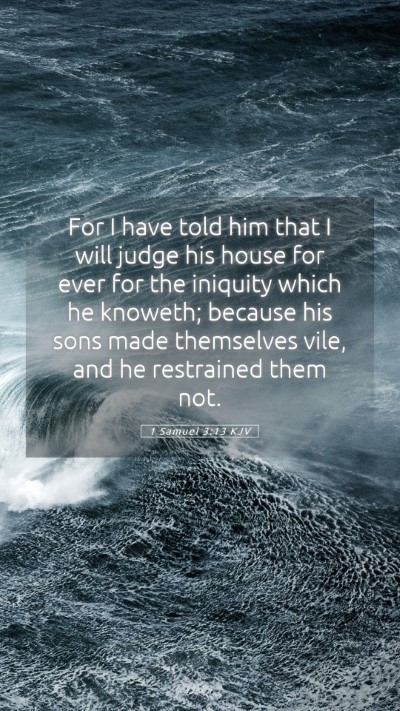Understanding 1 Samuel 3:13
In 1 Samuel 3:13, we encounter a profound moment in the life of Eli, the priest, concerning his failure to restrain his sons and the consequences of sin. This verse asserts the gravity of discipline and accountability within spiritual leadership, revealing core themes of judgment and mercy in the relationship between God and His people.
Bible Verse Explanation
The verse states: “For I told him that I would judge his house forever for the iniquity which he knows; because his sons made themselves vile and he did not restrain them.” This is a declaration from God about how Eli failed to correct the wrongdoing of his sons, Hophni and Phinehas, who indulged in sinful practices. Analyses from public domain commentaries, including those by Matthew Henry, Albert Barnes, and Adam Clarke, provide deeper insights into the theological implications and moral lessons derived from this verse.
Bible Verse Meanings
-
Moral Responsibility: Commentators emphasize that spiritual leaders like Eli carry a significant weight of responsibility. Eli’s inaction regarding his sons reveals neglect in his paternal and priestly duties, underscoring the need for moral vigilance in leadership (Albert Barnes).
-
God’s Judgement: The phrase "I would judge his house forever" highlights the permanence of God's judgment. It shows that continual sin without correction invites divine retribution, a theme echoed throughout biblical texts (Adam Clarke).
-
Parental Accountability: This verse serves as a warning to parents and leaders alike about the importance of guiding the younger generation. The failure to discipline can lead not only to personal ruin but also to communal consequences (Matthew Henry).
Bible Verse Interpretations
The interpretation of 1 Samuel 3:13 reflects on the intricate relationship between divine foreknowledge and human responsibility. God had foreseen Eli’s lack of discipline, which illustrates that divine foreknowledge does not negate human free will but instead highlights the need for accountable action in parenthood and leadership (Albert Barnes).
Significance in Scripture
The significance of this verse stretches beyond its immediate context. It echoes throughout Scripture, illustrating God’s justice balanced with His mercy. Leaders are portrayed as shepherds, with their primary role being to guide and protect their flock (Matthew Henry).
Application of the Verse
Understanding 1 Samuel 3:13 invites readers to reflect on personal leadership roles, whether within families, churches, or communities. It challenges individuals to consider how they address wrongdoing in their spheres of influence, urging a proactive stance in correction and guidance (Adam Clarke).
Bible Study Insights
This verse also serves as a focal point for group discussions in Bible study groups. Members can explore the dynamics of accountability, the role of discipline in spiritual growth, and the consequences of negligence in leadership.
Related Bible Cross References
- Leviticus 10:1-3: Reflects the seriousness of priestly conduct and obedience to God’s commands.
- Proverbs 22:6: Highlights the importance of training children in the proper way, reinforcing the theme of parental responsibility.
- Hebrews 12:5-11: Discusses the discipline from God and how it reflects His love, thus connecting it to Eli’s failures and the nature of divine correction.
Conclusion
1 Samuel 3:13 emphasizes the dire consequences of neglecting one’s responsibilities, particularly in the realms of faith and family. By analyzing this verse, individuals gain a richer understanding of biblical themes related to justice, accountability, and divine expectation, inviting deeper discussions in both online Bible study and Bible study lessons.


